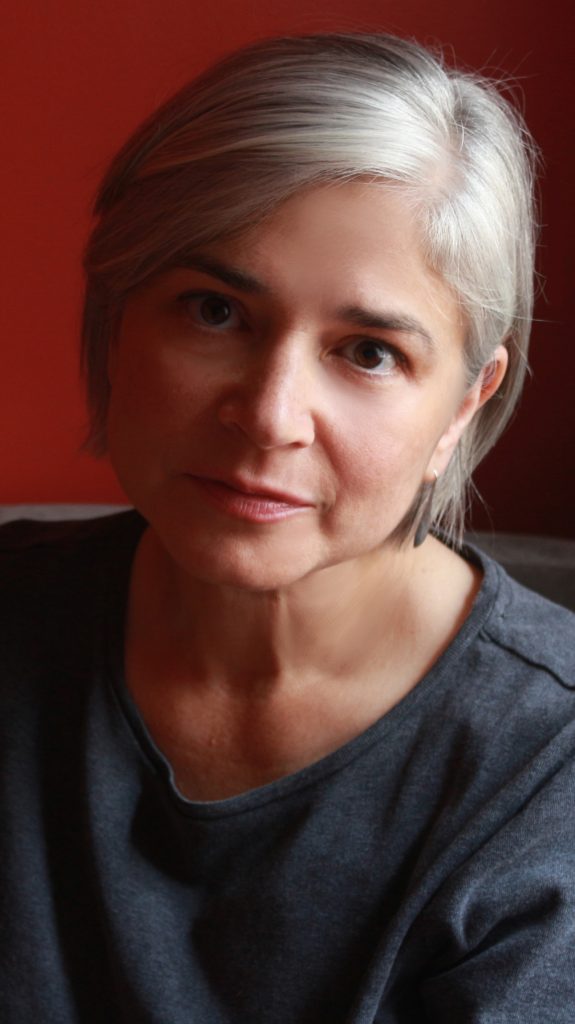Pregnancy makes you tired, they say. It’s the effort of making all those new cells, I suppose—those tiny, translucent organs—that consumes your energy at a bone-deep level. Every moment seems like a good time for a nap. Sofas beckon.
I’ve seen other women’s sonograms: the small twin lungs, the dark heart beating. At night, I close my eyes and see them, those hummingbird hearts. A few breaths later, I’m dreaming: open grassland, oceans softly rocking.
Nothing we can manufacture with our hands or our brains is so delicate and intricate, yet it all unfolds without our thought or will. Week seven: a beating heart. Week nine: nipples, elbows. Week twenty-two: eyelashes. Your body, doing all that.
Whether you want it to or not.
They say exhaustion hovers just above you like a blanket, ready to drop, ready to smother all those things you thought were so important: your career, your household chores, your circle of friends, the yoga class that seemed so crucial at the time. . . . Everything melts away. You’re an incubator, nothing but, your body a traitor to all your old causes. Equal pay for equal work, environmental justice, safety on the streets: very nice, but all you really crave is sleep—endless, luxuriant bouts of afternoon sleep, stretched out on the bed in a long rhombus of warm sun.
You arrange your limbs for comfort. Slumber closes down over you like a drug. You dream of a baby gazing up from your arms, curls shining, eyes radiant with love.
Then you wake, gasping for breath.
•
The legacy from my mother is seventeen things.
1. A small white house in the hills of West Virginia. The paint, fading even in my childhood, surely curls back now, peeling away in long crumbling strips, exposing bare wood to the elements. Home. The nest. The scene of the crime. No one lives there now except the wild things.
2. A craving for nicotine. I chew gum, fiddle with paper clips, gnaw ends of yellow pencils.
3. A thirst for hard liquor.
4. A taste for rough men. Hers were bikers and truckers. Mine were attorneys, surgeons, sons of wealthy families, boxers, men who owned boats. All self-declared masters of their various universes. They seemed powerful, bold, magnetic. Control is sexy, until it’s not. Married now two years to Jon—a Darcy, a Knightley, a truly good man—I like to think I have outgrown this particular inheritance.
5. A hunger to run.
6. A taste for cheap food. Hamburger Helper. Kool-Aid. Oscar Mayer. Uniform slices of pink, rubbery bologna, red-rimmed, smeared with mayonnaise, squashed between spongy white slices of bread. Tuna casserole made with cream of mushroom soup and gray canned peas, with potato chips crumbled on top. Heinz ketchup squeezed onto Kraft macaroni and cheese and stirred with a fork until orange.
In Jon’s circle, such things aren’t eaten. They’re punchlines, the stuff of aghast remarks. I cook them alone in the kitchen at night, after he’s fallen asleep, and eat standing up at the counter, staring out over the black lake.
7. A suspicion of the state and its services. Social workers. Police. Anyone who wants to help us.
8. Silence. What you don’t say can’t haunt you. Plead the Fifth.
9. A love of dark licorice, sweet like danger. In my childhood, it was an exotic treat, rare and expensive—a delicacy, a thing that miraculously appeared at Christmas and birthdays or in the pockets of the men my mother saw. I’m told the taste for licorice is hereditary. You like it or you don’t.
10. My long-boned, capable hands. They can change a tire, build a table, twist stuck lids off jars. Break a limb.
11. A belief in ghosts.
12. A jumpy metabolism. Skittish. My friends here in Chicago often ask what diet I’m on (or, more quietly, which pill I take—and where can they get some?).
13. A fear of incarceration, whether by reason of insanity or crime.
14. A love of fairy tales. She used to read them to me at bedtime. I would touch the illustrations with my finger while her scratchy voice unspooled the tale.
15. A fear of children. Their messes. Their perpetual demands. Their softness. The terrible fragility of their bodies.
16. A tiredness, bedded down deep in my bones. Even before I was old enough to drink, I woke in the mornings exhausted, worn and bleak, thinking, Another day? An old woman inside a young girl. And in my mother’s eyes: that same look.
17. Grief. Like an ocean. Like madness.

Joy Castro is the author of the memoir The Truth Book (2005), the essay collection Island of Bones (2012), and the short fiction collection How Winter Began (2015), all from the University of Nebraska Press, and of two literary crime novels set in post-Katrina New Orleans, Hell or High Water (2012) and Nearer Home (2013), both from Thomas Dunne/Macmillan. My work has won the Nebraska Book Award and the International Latino Book Award and been a finalist for the PEN Center USA Literary Award. My short fiction and nonfiction have appeared in journals including Ploughshares, Seneca Review, Indiana Review, Afro-Hispanic Review, Gulf Coast, Brevity, and The New York Times Magazine.
![[PANK]](https://pankmagazine.com/wp-content/themes/pank/assets/images/pank-logo-large.png)
